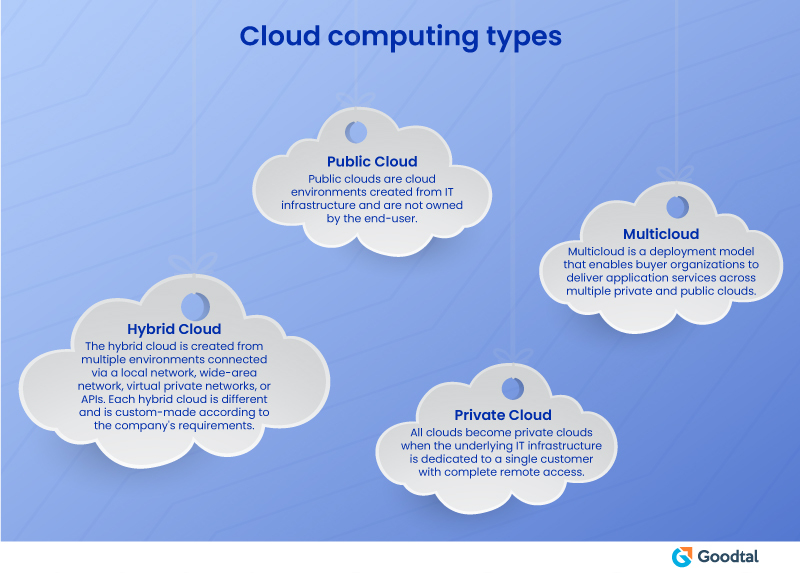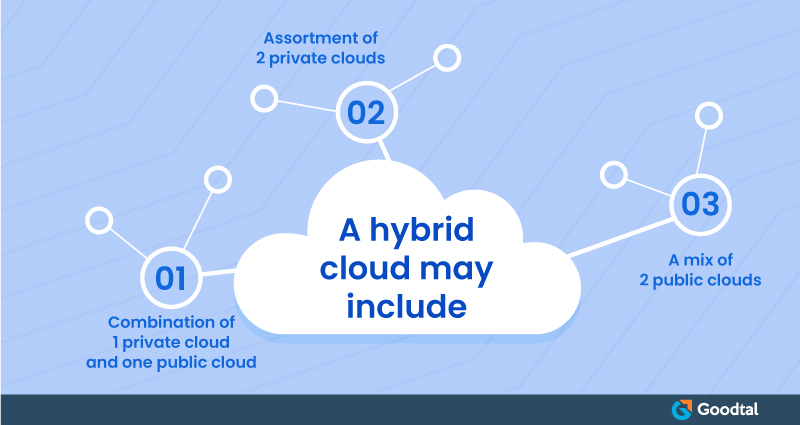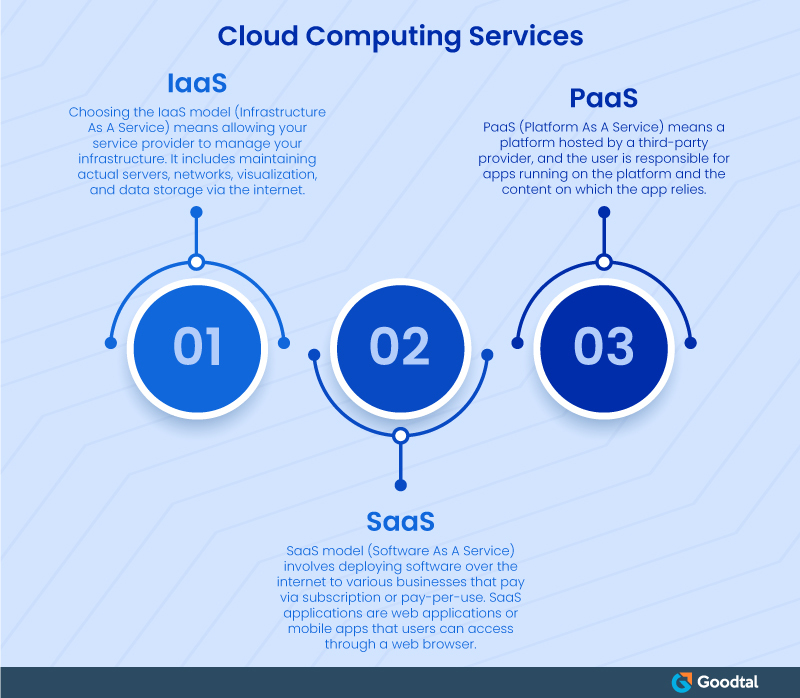
Cloud computing is no longer a mystery to the people. Awareness about it shows how the world has progressed and is moving towards digital transformation. Everyone has finally accepted the cloud to be part of their daily lives. Even if people are not fully aware of this technology's implications, ignoring this would be a grave mistake. This is our small contribution to making people understand what cloud technology is.
What Is Cloud Computing?
In layman's terms, Cloud computing provides computing services over the cloud. It is a term for hosting delivery services over the internet, for example, sharing data or storing it in the cloud for public or private access. In short, it allows the users to operate virtually rather than processing data with on-premises facilities. Cloud Computing can be divided into two parts: The Cloud and the Computing. "The Cloud" is the deployment model of the Cloud strategy, while “the Computing” is the service model.
Why Is It Important?
Lockdowns throughout the pandemic, taught companies about the importance of cloud infrastructure. A tech analyst, Gartner, predicted that by the year 2025, every application software, infrastructure software, business process services, and system infrastructure market will have shifted to the cloud. The percentage is only 41% in 2022.
The scale of cloud spending is constantly increasing. For the long-term analysis, the analyst has predicted the computing and storage cloud infrastructure spending. It will see a compound annual growth rate of 12.4% over the period of 2020-2025. This means it will reach $118.8 billion in 2025. This accounts for 67.0% of total compute and storage infrastructure spending.
All predictions regarding cloud-computing spending are pointing in the same direction, even if the details are slightly different. The graph of the expenditure on cloud computing is going north and will continue so. Hence, cloud computing is fundamental.
Cloud Computing Type and Cloud Computing Services
There are 4 types of cloud computing and 3 types of cloud computing services:
Cloud Computing Types
Choosing the cloud computing type is important because no two styles are similar. Understanding each of them will make it easier for you to choose the correct type for your business. There are 4 types of cloud computing:

1. Public Cloud: Some of the largest public cloud providers are Amazon Web Services (AWS), Alibaba Cloud, Google Cloud, IBM, and so on. Public clouds are cloud environments created from IT infrastructure and are not owned by the end-user. The cloud becomes public when settings are broken and redistributed. Some cloud providers allow tenants to use the services for free. Hence, the fee structure is not an essential factor.
2. Private Cloud: It means the cloud belongs to the end-user. It is not open for people to use. All clouds become private clouds when the underlying IT infrastructure is dedicated to a single customer with complete remote access. Organizations are now building private clouds on rented, vendor-owned data centers located off-premises, making obsolete any location and ownership rules.
3. Hybrid Cloud: The hybrid cloud is created from multiple environments connected via a local network, wide-area network, virtual private networks, or APIs. Each hybrid cloud is different and is custom-made according to the company's requirements. The IT system of the company becomes hybrid if apps are moved from one cloud to another.

4. Multiclouds: Multiclouds consist of the mix and match of more than one cloud type. All hybrid clouds are multiclouds, but not all multiclouds are hybrid clouds. Multicloud is a deployment model that enables buyer organizations to deliver application services across multiple private and public clouds. It contains one or more combinations of the following: numerous cloud vendors, numerous cloud accounts, multiple cloud availability zones, or multiple cloud regions or premises.
Cloud Computing Services
Cloud services are infrastructure, platforms, or software hosted by third-party providers. They are made available to users via the internet. There are 3 types of cloud computing services:

1. IaaS: Choosing the IaaS model (Infrastructure As A Service) means allowing your service provider to manage your infrastructure. It includes maintaining actual servers, networks, visualization, and data storage via the internet. The user can handle systems and apps, whereas the provider manages hard drives and servers. He takes care of repairs and damages as well. This is one of the most common service models of cloud computing. Because it offers the fundamental infrastructure of virtual servers, networks, operating systems, and data storage drives. It has proved perfect for small and medium-sized organizations looking for a cost-effective IT solution.
2. PaaS: PaaS (Platform As A Service) means a platform hosted by a third-party provider, and the user is responsible for apps running on the platform and the content on which the app relies. It gives the users a shared cloud platform for application development and management without building and maintaining the infrastructure usually associated with the process. Web applications can be created quickly and easily via PaaS. The service is quite flexible and robust to support them. This model is significant when solutions are scalable and ideal where multiple developers work on a single project.
3. SaaS: SaaS model (Software As A Service) involves deploying software over the internet to various businesses that pay via subscription or pay-per-use. SaaS applications are web applications or mobile apps that users can access through a web browser. They connect to the cloud applications via a dashboard or API. SaaS also eliminates the need to have an app installed locally on each user's computer or phone, allowing more effective methods for the group or team to access the software. All the responsibilities, like software updates, bug fixes, and other general maintenance issues, are taken care of for the user.
Examples and Companies Employing Cloud Computing
Cloud computing includes vast services, including storage of data, managing it and processing it, running the application, etc. Companies and individuals use it as much as they require. It allows large enterprises to host all their data and run all their applications in the cloud. For example, Netflix uses cloud computing to store its content, stream videos, and other business services. Hence, Cloud computing is becoming the primary option for many apps, and software vendors are tempted to offer their applications as services over the internet. They do not provide it as a standalone product, so they can switch to a subscription model.
Two of the most promising examples of cloud computing are:
Gmail – All the emails that were initially downloaded and stored in one device are now stored in the cloud and can be accessed from any device anywhere, from a desktop computer to Smartphone.
Another classic example of cloud computing is digital wallets and plastic money. People hardly carry and accept cold cash. Every transfer is made online with the help of a digital wallet. Plastic money is more abundant and convenient because every bank database is integrated with the cloud.
Benefits of Cloud Computing
Cloud computing has various benefits. Here is the link to learn why cloud technology is the future. Some of the reasons to incorporate cloud technology in your business are as follows:

1. Security Issues
The organizations planning to invest in cloud computing services are worried about being hacked. They think if anyone can access it, what will stop hackers from doing so. Most companies who have switched to cloud computing services have claimed an improvement in security than the ones that do not have. Cloud hosts will carefully monitor security around the clock, significantly more efficiently than a conventional in-house system. And another thing is the acknowledgment of internal theft.
2. Cost-Saving
Many companies, which comprise 20% of the total companies on this planet, think that investing in cloud computing might incur unnecessary costs. Those who believe they need to pay for the features they neither require nor need can relax because the cloud is pay-as-you-go. You can only buy the services you require, and you can choose to leave out the rest. The pay-as-you-go system applies to the data storage space needed to service your stakeholders and clients. When you accept this model, you are only paying for the space you need and not being charged for any area you don't take up.
3. Flexibility
Your business requires you to focus on areas that are crucial to you, and IT services should not be one of them. In contrast, outsourcing cloud computing services will take that burden off you. Thus, the cloud offers businesses more flexibility than hosting on a local server. Remember that if you need extra bandwidth, it will be managed by a cloud-based service. It is always a better option than undergoing a complex (and expensive) update to your IT infrastructure.
4. Increased Collaboration
If a business has more employees, cloud development makes it easier to collaborate. Cloud computing makes collaboration a simple process. Team members can view and share information quickly and securely across a cloud-based platform. Some cloud-based services even provide collaborative social spaces to connect employees across your organization, increasing interest, and engagement.
5. Auto – Updates
Everyone means everyone, and not a single soul on Earth operating a computer or mobile phone enjoys its updating. Hence, cloud computing automatically refreshes and updates itself. This saves valuable IT staff time and money spent on outside IT consultation.
Disadvantages of Cloud Computing
It would be wrong to say that cloud computing doesn't have drawbacks. It does, but they are not something that is not worked upon. Everyday cloud computing is advancing, but for now, here are some of its shortcomings:
1. Confidentiality Issues
If the cloud medium is public, people might be able to see what they are not supposed to. The risk of data leaking is higher. Hence, the confidentiality issues for cloud computing are yet to be found the solution for. The cloud should be secured enough.
2. Internet Connection
Internet availability and strong connection are the two most essential things with cloud computing. If your place does not have a steady internet connection or the internet path to the cloud provider is in trouble, automatically, access to your cloud computing machine will be disconnected. This is the biggest obstacle in developing countries as developed countries are capable enough of having a good internet connection.
3. Security
Just like confidentiality issues, security issues could ruin the company. If all the company's information is stored in the cloud and is hacked, it can all go south and be destroyed.
4. Data Ownership
The data ownership might be compromised, and it can confuse the cloud as to who owns the data. Thus, this can become a threat to upload crucial data managed and safeguarded perfectly. Hackers are continuously trying to hack into cloud provider systems in today's digital age, so cloud computing services might not be preferred that much.
5. Cost
The unforeseen cost could be higher, and the companies might not be ready to go for cloud computing unless it becomes necessary for them. They might not be prepared to invest in it just now even though its demand had constantly increased after the pandemic.
Wrapping Up
Cloud computing is a modern concept not known to many. Its benefits are yet to be understood, and only a developer knows how it can be employed and utilized with maximum optimization. If you hire the correct cloud developers, they can do miracles for your business. Because virtually all enterprises worldwide will likely consume cloud service, signaling that most applications and enterprise information flows will inevitably be cloud-based. Cloud computing will become more than just a consumption model – it will be central to shaping business IT strategy.
